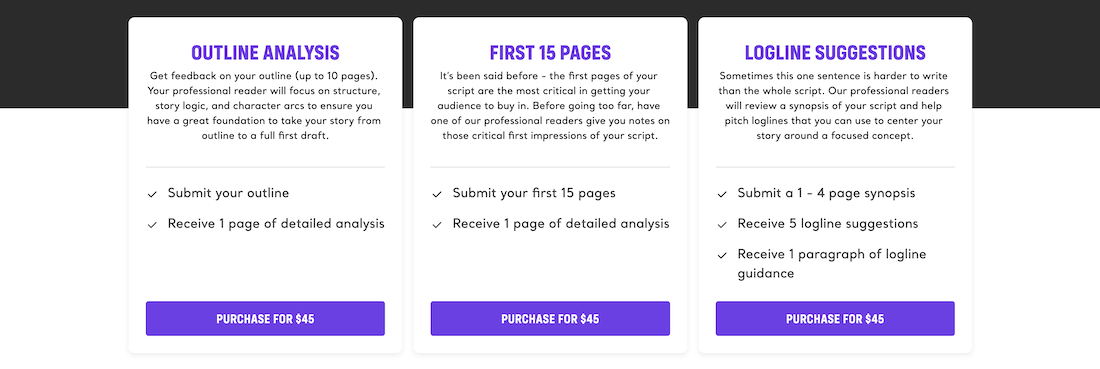101 Character Traits for Movie, TV, and Literary Characters

When it comes to character development, you can often feel overwhelmed by the many rules, directives, and guidelines offered to you by books, lessons, classes, lectures, and interviews. While the tools provided can help you find your characters, the process of character development is actually easier than you think, and it all starts with conflict and character traits.
A simple two-step process involves:
- Creating a character that will struggle with the core conflict presented in the premise.
- Adding character traits that either help or hinder them in overcoming the conflict at hand.
When you then merge those two elements with the many conflicts they are forced to face within the conflict of the story, character development and depth will take on a life of their own.
With that in mind, here we take 101 basic personality traits that you can turn into traits that define the characters within your story. Character depths and arcs are presented when you pit those traits against the conflict of the story, and either have your characters succumb to the conflict because of them, grow past them for compelling character arcs, or embrace them to overcome any conflict that comes their way.
Read More: 9 Types of Enneagram Personalities Writers Can Use for Characters

'Joker: Folie à Deux' (2024)
101 Character Traits for Movie, TV, and Literary Characters
These character traits are presented as character types that you can mold and blend as necessary within your story:
- Absent-minded: They forget things and aren't very attentive in life.
- Achievement-oriented: They want to develop and showcase their abilities to others.
- Active: They are overly active and ready to engage.
- Aggressive: They don't hesitate to attack or confront.
- Agreeable: They have a cheerful and pleasant personality.
- Altruistic: They are selfless and display concern for the well-being of others.
- Anxious: They feel extreme unease about uncertain outcomes.
- Assertive: They are confident and forceful in their actions.
- Boastful: They brag and have excessive pride and self-satisfaction.
- Brave: They don't hesitate to face danger, conflict, and pain.
- Careful: They'll do everything to avoid harm.
- Careless: They don't care about others and give little thought to making mistakes.
- Cautious: They do their best to avoid harm and danger.
- Cheerful: They are always happy and usually optimistic.
- Compassionate: They feel empathy and compassion towards others.
- Confident: They are certain of their abilities and capabilities.
- Conscientious: They work in thorough and productive ways.
- Consistent: They rarely change their approach and methodology.
- Conventional: They do their best to abide by what is socially acceptable.
- Creative: They have creative and original ideas and solutions.
- Critical: They don't hesitate to showcase their disapproval or judgment.
- Curious: They want to learn or know about new things — for better or worse.
- Deceitful: They mislead others.
- Dependant: They overly rely on others to function.
- Depressed: They are unhappy and often wallow in sadness.
- Diligent: They are specific and conscientious in their work and approach.
- Disciplined: They follow a dedicated way of behaving and working.
- Dogmatic: They automatically communicate and follow principles they believe are true.
- Dominant: They showcase a certain power and influence over others.
- Efficient: They are precise in their productivity with minimum waste.
- Egocentric: They think only of themselves, usually without regard for others.
- Emotional: They are outwardly affected by their inner feelings and come off as easily excitable or overly emotional.
- Energetic: They always showcase great activity and vitality.
- Expressive: They don't hesitate to communicate their thoughts or feelings.
- Extravagant: They don't hesitate to spend and use resources.
- Extrovert: They are very outwardly social and often seek fulfillment outside of themselves.
- Faithful: They are loyal and steadfast in their beliefs and those close to them.
- Fearful: They showcase their fears, emotions, and anxieties.
- Feminine: They have qualities traditionally associated with women.
- Friendly: They are kind and pleasant towards others.
- Gritty: They are very tough while always showcasing courage and resolve.
- Greedy: They always want and desire more than what they have, and are willing to take it before others.
- Guilty: They are haunted by feeling as if they've done something wrong or failed someone.
- Honest: They are truthful and sincere.
- Hypochondriac: They are abnormally anxious about their health.
- Hypocritical: They don't practice what they preach.
- Impulsive: They act without thinking things through first.
- Independent: They don't comply and are not swayed by others.
- Innovative: They are original and creative in their thinking.
- Insecure: They have low self-esteem and are unsure of themselves.
- Intellectual: They focus on objective reasoning and understanding.
- Introverted: They are more anti-social and tend to seek fulfillment from within themselves.
- Inventive: They can create new things and ideas with what they know and have around them.
- Ironic: They are sarcastic and utilize irony whenever possible.
- Irresponsible: They aren't accountable for their actions and often put themselves, and others, in harm's way.
- Lazy: They are unwilling to work or use energy.
- Lively: They are active, outgoing, and full of life.
- Loyal: They always showcase firm and consistent support and allegiance to those close to them.
- Manipulative: They try to control others.
- Masculine: They have qualities traditionally associated with men.
- Modest: They are unassuming in estimating their abilities and achievements.
- Moody: They are prone to sudden and unpredictable mood swings.
- Negative: They showcase negative emotions and expectations.
- Negligent: They usually fail to take proper care of their duties.
- Nervous: They are easily agitated, alarmed, and fearful.
- Neurotic: They are overly sensitive, obsessive, or anxious.
- Obsessive: They have difficulty in letting go of things, people, or ideas.
- Open: They are open to new experiences and ideas.
- Organized: They are structured and systematic in their approach.
- Outgoing: They are friendly and confident in social interactions.
- Oversensitive: They are overly sensitive to criticism and conflict.
- Passive: They are often without response or resistance to conflict.
- Pompous: They are affectedly grand, solemn, or self-important.
- Positive: They approach emotions and expectations in positive ways.
- Precise: They are exact, accurate, and detail-oriented.
- Pretentious: They try to impress by misleading others.
- Quiet: They are mild and reserved by nature.
- Rational: They tend to use reason and logic.
- Reckless: They don't care about or consider the danger or consequences at hand.
- Reserved: They hesitate to reveal emotions or opinions.
- Resilient: They are able to withstand or recover from conflict and struggles.
- Risk-taking: They don't hesitate the uncertainty of taking risks.
- Self-assured: They are confident in their abilities and character.
- Sentimental: They are prone to feelings of tenderness, sadness, or nostalgia.
- Sensation-seeking: They go out of their way to discover new sensations, feelings, and experiences.
- Sensitive: They are overly and easily distressed and don't hesitate to pick up on the feelings of others.
- Shallow: They lack depth and are incapable of serious thought and consideration towards others.
- Shy: They are usually nervous or timid in social situations.
- Sincere: They speak their mind without pretense or deceit.
- Sloppy: They are careless and unsystematic.
- Sly: They are cunning and deceitful of nature.
- Sociable: They are friendly and willing to engage with others in social situations.
- Solitary: They often enjoy being and living alone.
- Stable: They are not easily upset or disturbed.
- Superficial: They lack depth of thought or character.
- Talkative: They talk a lot.
- Tense: They are unable to relax amidst nerves, anxiety, and conflict.
- Thorough: They are attentive to details and focused.
- Tough: They can endure hardship or pain.
- Unconventional: They don't adhere to what is generally done or believed.
- Withdrawn: They don't like communicating with others.
WANT MORE IDEAS? TAKE A LOOK AT OUR OTHER STORY PROMPTS!
Check out our Preparation Notes so you start your story off on the right track!

Ken Miyamoto has worked in the film industry for nearly two decades, most notably as a studio liaison for Sony Studios and then as a script reader and story analyst for Sony Pictures.
He has many studio meetings under his belt as a produced screenwriter, meeting with the likes of Sony, Dreamworks, Universal, Disney, and Warner Brothers, as well as many production and management companies. He has had a previous development deal with Lionsgate, as well as multiple writing assignments, including the produced miniseries Blackout, starring Anne Heche, Sean Patrick Flanery, Billy Zane, James Brolin, Haylie Duff, Brian Bloom, Eric La Salle, and Bruce Boxleitner, the feature thriller Hunter’s Creed, and many produced Lifetime thrillers. Follow Ken on Twitter @KenMovies and Instagram @KenMovies76.
Get Our Screenwriting Newsletter!
Get weekly writing inspiration delivered to your inbox - including industry news, popular articles, and more!



























